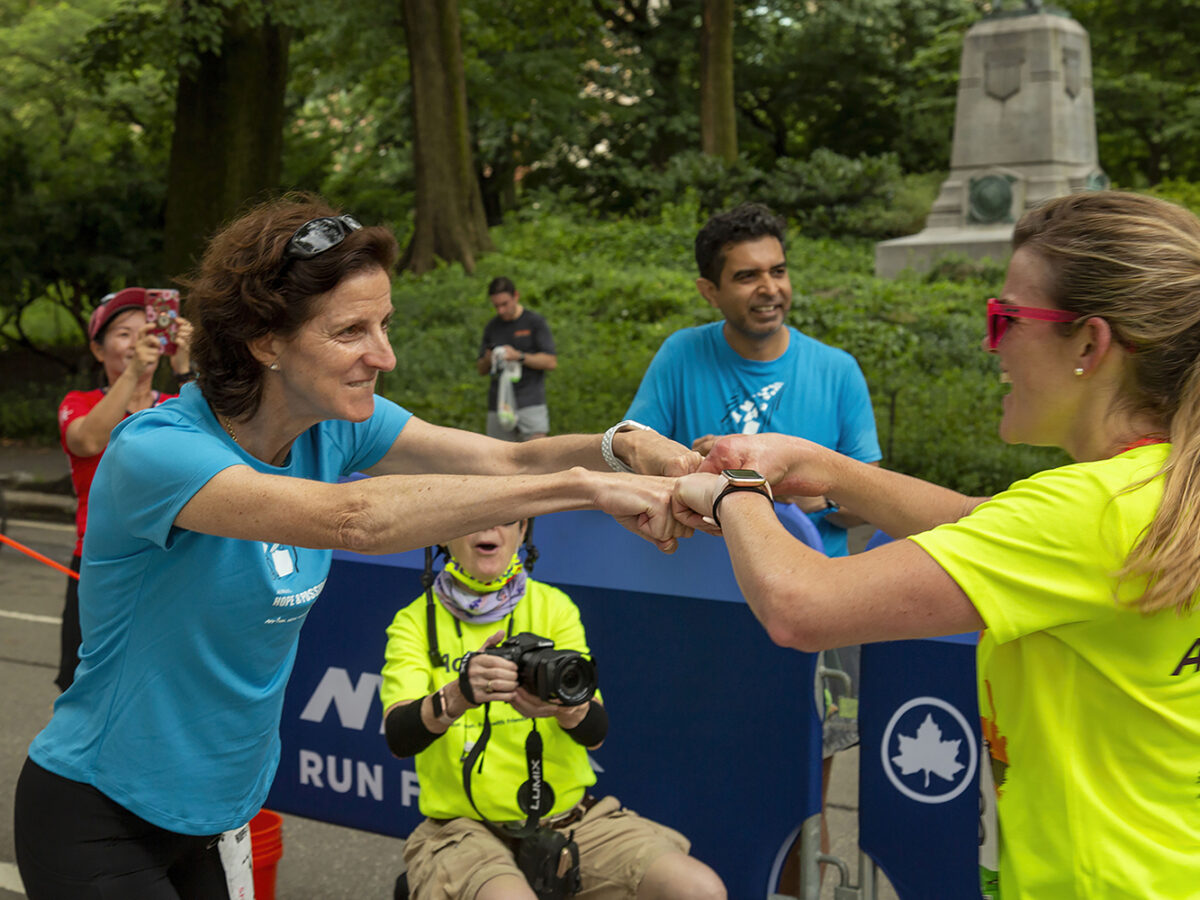Emily Glasser

Emily Glasser ’85 is emphatic about what she believes is missing in today’s conversations about diversity, equity and inclusion. “The ‘I’ in DEI must include people with disabilities,” she says. “They are an indispensable part of the American story, yet they frequently find themselves on the sidelines. Our goal is to change that narrative.”
As president and CEO of Achilles International, Glasser works to provide athletic programs and social connection for members of the disability community. It’s a mission that Glasser takes to heart. “My daughter has a chronic illness that limits her activity,” she says. “I have a sister-in-law with multiple sclerosis, a nephew who’s on the autism spectrum, and my mother-in-law has lupus. Given that one in four Americans lives with a disability — the country’s largest minority group — it’s no surprise that I have family members with disabilities.”
Long before she arrived at Exeter as a lower, Glasser developed a passion for community service from her parents, beginning with family volunteer stints at a Chicago food bank, near where she grew up in Lake Forest, Illinois. “I’m mindful of the importance of service and giving back to the communities in which I’m a part,” she says. “Once I had children of my own, my interest in making a meaningful difference in others’ lives took on renewed resonance.”
She followed her sister, Mary Glasser ’83, to Exeter and immediately joined the school community. An athlete, she swam, played field hockey and tennis, and often ran the trails behind the football stadium. She happily recalls having vigorous conversations around the Harkness table and building close relationships with other students and teachers. “My years at Exeter were probably among the most impactful years of my life,” Glasser says. “The students were learning from each other, making mistakes, and figuring out how to work through them. The importance of community was really imprinted on me there.”

After graduating from Dartmouth College, Glasser worked as a financial analyst at an investment bank. “I quickly realized it wasn’t feeding my soul in the way I wanted it to,” she says. “I was missing something.” Inspired to pursue a purpose-driven career, Glasser worked in arts education, managed the Museum of Modern Art’s Destination: NYC product collection, co-founded a digital arts education startup, then directed strategic partnerships for Goalsetter, a platform offering financial education and literacy to young children.
An avid runner, Glasser joined Achilles in 2019 as a support runner for a young man on the autism spectrum. “It was so moving to know that my standing alongside him gave him an opportunity to move his body,” she says. Bursting with ideas after her experience, Glasser offered feedback to a friend at Achilles about ways to improve the volunteer experience and grow the organization. She stepped into the CEO role in late 2019, after the retirement of Dick Traum, the organization’s founder and the first person with a prosthetic leg to complete the New York City Marathon.
Glasser and her team are utilizing Achilles’ focus on running and road races to build community through socialization. The nonprofit, which has 28 U.S. chapters and 42 international locations, serves a spectrum of athletes, including wounded military personnel and veterans, children with disabilities and, more recently, dementia and long-COVID patients in the New York City area. “Not all of the athletes we serve participate in races,” Glasser says. “We take an activity that’s about the individual — running, walking, cycling — and make it about partnership and community.”
Glasser’s expertise in building strategic partnerships has paid off in other ways. Achilles athletes are participating in trials of Google’s Project Guideline, a program developed in partnership with Guiding Eyes for the Blind that uses a phone app and headphones to allow visually impaired runners to run or walk outdoors without assistance. This spring, Lyft’s Citi Bike and Achilles launched an adaptive cycling program in New York City, enabling riders with disabilities to test handcycles or tandem bikes in Central Park and in Brooklyn, Queens and the Bronx.
Glasser envisions expanding Achilles’ role as an advocacy organization, promoting inclusion and accessibility for different communities around the world. That vision is fed by the courage and resilience of the athletes with whom she works every day.
“Achilles utilizes the unifying power of sport to make a difference in people’s lives,” she says. “I have an extraordinary team of like-minded colleagues who share a vision to create a more inclusive and accessible world. We’re not going to stop until we get there.”
— Debbie Kane
This profile was first published in the summer 2022 issue of The Exeter Bulletin.


